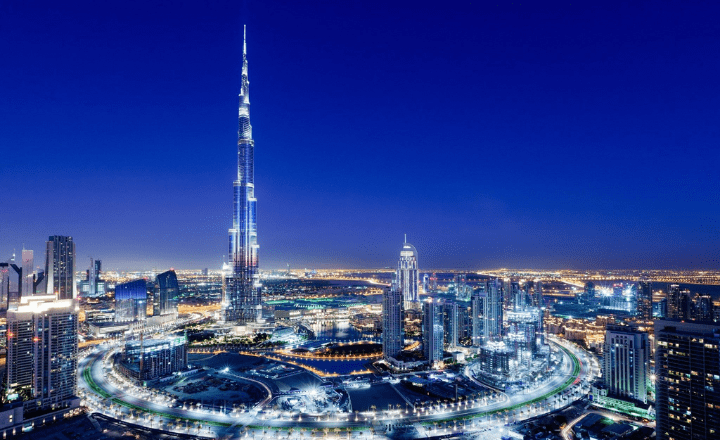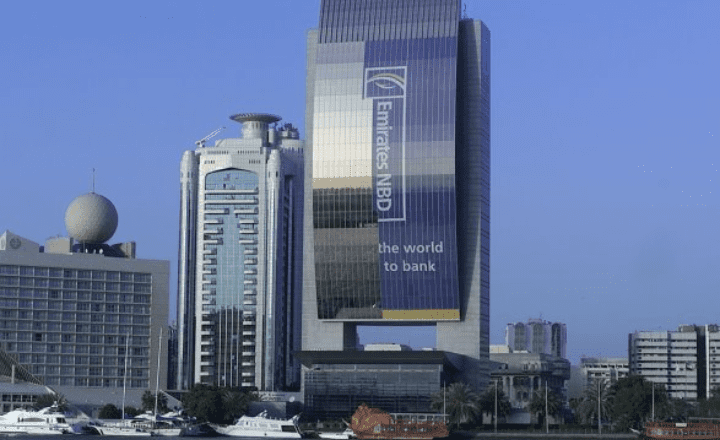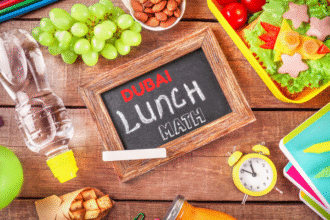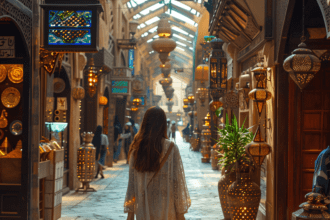The most miraculous city in the world, Dubai is the financial capital of the United Arab Emirates. The city is appealing to the eyes having tremendous unique features, like the tallest skyscrapers to an artificial island, it is merely one on the planet.
Economy of Dubai is multifaceted, and numerous elements, include wholesale and trade, real estate, aviation and transport, banking, and tourism. With its stable economy, it is at the apex of financial units.
Major Economic Factors:
Dubai has the most favorable and strategic location in the world. Its business-friendly policies and better infrastructure played a role in its economic growth and prosperity. Multiple factors, from oil and gas to real estate, aviation, and beyond, comprise its financial growth and progress. Financial success has witnessed many hazards along with time utilizing all resources that could be used to achieve economic stability.
Oil reserves:
Dubai is a major contributor to the United Arab Emirates economy adding about 115 billion Dollars to its GDP. Its 95% of income is generated by other sources, almost 20% is produced through tourism, and the remaining is collected by other sources.
Until now, oil has accounted for less than 1% of GDP, and tourism produces 20%. Dubai was one of the cities that survived the financial crisis and suffered less in the international market during the shortage of fossil fuels.
Oil contributed to almost 50% in the financial sector now it has dropped to almost 1%. Its economy is now multifaceted and is comprised mainly of non-oil elements.
Trade and wholesale:
Wholesale and trade are the main contributors to the financial sector of Dubai. Some of the figures depict the worth of this sector as the leading contributor to the total GDP at 22.9% with a value of AED 26.3 billion, compared to AED 25.5 billion during the same period in 2023, achieving a growth rate of 3%.
The wholesale and retail trade activity supports all other sectors of the economy by ensuring the availability of goods that serve multiple purposes.
The Wholesale City in Dubai is the first established trading hub of regions and is spread over an area of 550 million sqft. it is a member of the TECOM Group and was created to serve as a basic immediate and readily available shop for traders.
Dubai Wholesale City provides services to wholesale traders and buyers including shipping, insurance, warehousing, banking, residential units, hotels, markets, and showrooms attracting investors worldwide and adding to economic growth.
Tourism and hotels:
Dubai is a favorite tourist destination. It is appealing because of its amenities and residential facilities in hotels, including the lower 39 stories of the tallest skyscraper, the Burj khalifa. Many visitors visit Dubai annually, adding a handsome amount of money to their income.
This sector is contributing 10% to GDP, but there is still a long way to go, as progress is increasing by leaps and bounds. Burj Kalifa is a favorite tourist destination, offering the opportunity to experience amazing sights near clouds.
Other places to visit include The Dubai Fountain and Palm Jumeirah. Tranquility and nature near the sea appeal to millions worldwide. If someone is interested in history and culture, the best places to visit are Dubai Creek and the desert. For adventures, Skydive Dubai leaves no stone unturned to develop this sector to the fullest.

Aviation and transport:
The share of the aviation and transport sector to Dubai’s GDP is 13.4%, contributing about AED 15.4 billion in 2024. The growth in this sector is significantly important to its GDP.
The development of airports and national transport exceeded the growth of the aviation and transportation sector. The facilities provided are more appealing and reliable services add to the flavor.
Global air travel in Dubai has over 5.4% growth of passengers annually. The impressive growth of this travel has surpassed many adding millions of dollars to the national treasure of Dubai.
All national and international Airlines use Dubai International Airport (DXB). but also by all other airlines, the rate of growth here is immense. The growth in this sector is significantly important to its GDP.
The development of airports and national transport exceeded the growth of the aviation and transportation sector. The facilities provided are more appealing and reliable services add to the flavor.
Global air travel in Dubai has over 5.4% growth of passengers annually. The impressive growth of this travel has surpassed many adding millions of dollars to the national treasure of Dubai.
Finance and insurance sector:
The financial sector achieved a real growth of 5.6% compared to the same period in 2023, reaching AED 15.1 billion compared to AED 14.3 billion in the first quarter of last year. This area contributed 13.1% to Dubai’s all-out economy, expanding development by 0.7 rate focuses. As per National Bank of the UAE information toward the finish of the main quarter of 2024, there was an 8% development in credit adjusts and a 15.2% development in store adjusts contrasted with a similar period in 2023.
With the highly reliable services these sectors provide they have established their status as essential financial factors.

Real estate and property:
The government of Dubai had a strategic plan to transfer the economy from oil-based to non-oil entities. This vision brought huge investment in the city specifically in real estate and property.
The megaprojects, like the seaward Palm Island and The World, and the inland Dubai Marina, Burj Khalifa complex, Dubai Waterfront, Business Sound, Dubailand, and Jumeirah Town brought a financial boost to this sector
Skyscrapers in Dubai like the Emirates Pinnacles, are the tallest structures on the planet, occupying the fifth and twelfth positions. The Burj-al-Bedouin Inn, situated on the island at present is the world’s fifth tallest and most costly place to visit and for residence.
The tallest building Burj Khalifa is also located in Dubai. It is 828 m (2,716.5 ft) tall and has 163 stories. Mighty Burj Khalifa is the Dubai Shopping Center, which when developed was the world’s biggest shopping center.
Information Technology, Industry and Manufacturing:
Information technology and innovative industry contributed 4.1% of the Gross domestic product in 2018, the sector can be made more productive as the modern era is of digitalization and AI.
Dubai is also home to some prominent industrial developments in energy production through DEWA, although this is water and power production for Dubai.
In the aluminum industry Emirates Global Aluminum produces 2.4 million tonnes of aluminum per year (~ USD 3.8B in revenue). Investments were made in car manufacturing with Zarooq Motors; the start of the UAE car industry.
Production and sales began in 2019 and are likely to be primary producers in the automotive industry over the coming years. Dubai Ports is also an eminent instance of industrialization in Dubai.
Diamonds and gold:
When Russia faced sanctions on its exports of gold Dubai became the city of gold as it was a trade hub for Russian gold also known as the city of gold became a trade hub for Russian gold. Dubai under the supervision of French Logistics, Temis Luxury Middle East became the largest handler of Russian gold.
Other largest handlers of gold shipped in the UAE in 2023 included Shams Gold Trading with 8 tonnes, Privilege Group DMCC with 7.5 tonnes, Al Aseel Jewellery LLC with 5.3 tonnes, and Paloma Precious DMC with 5.1 tonnes
All the financial activities related to diamond and gold trading in Dubai take on an exchange managed by the Dubai Multi Commodities Centre, in the Almas Tower in the JLT business cluster.
Amenities and services include Kimberley Process Certification offices, secure transportation agencies such as Brinks and Transguard, and other facilities such as networking and meeting rooms. The DMCC houses over a thousand precious stone companies, both Emirati and foreign.
Future Economic Plans of Dubai:
Dubai has already commenced its ten-year plan in early 2023, revealing a series of measures intended to double its economy. The announcement of a new 10-year plan from Dubai’s ruler, Sheikh Mohammed bin Rashid was a step to the beginning of a bright and stable future.
The 10-year plan is by far the most aspiring of the emirate’s moves to make the city a powerful force globally, as the UAE moves away from its dependence on oil. Dubai’s economy is converted to non-oil-based revenue currently, and it is already leading the way in generating income from other sources, such as tourism and finance, information and communication technology. The major D33 project along with other minor projects is all set to build a promising future for Dubai.
D33 a Global Ambition:
Dubai Monetary Plan (D33) is a smart course of action to double the size of its economy by 2033 and make it one of the main three urban areas for individuals to contribute, live, and work. The arrangement centers around developing Dubai’s computerized economy advancing advancement and sustainable turn of events.
Major projects will help increase foreign trade providing almost 4 million, and make Dubai the main hub for logistics, finance, tourism, and technology. D33 will make Dubai one of the world’s best places for residence and business.
It will make advancements in security, and internet facilities, to make it the most connected and innovative city by 2033, attracting investments from around the world.
The main areas of the plan are logistics, manufacturing finance tourism, and innovation. It consists of new trade corridors with 400 cities worldwide, with a key focus on Africa and South America.
The UAE has always been curious to build new partnerships with neighboring economies and previously attracted a lot of foreign direct investment (FDI). So while 400 cities may sound ambitious, Dubai has the resources and connections to make it happen.
Sandbox Dubai:
The revolution is at the pivotal point of D33 with projects like “Sandbox Dubai” to promote new technologies and make the city an innovation hub. Dubai is at the precipice of a digital revolution not just like Silicon Valley, led by artificial intelligence.
Government agencies are already implementing AI in their processes, leading Dubai to quickly become a future-forward economy, employing virtual assistants and robots to help customers.
UAE set an errorless vision through its man-made intelligence system, to become one of the world’s antecedents in computer-based intelligence by 2031.
Conclusion: Economy of Dubai
Economy of Dubai has changed from oil-based to a different, organization-arranged overall community point, with oil contributing essentially 5% to its GDP. Its progress originated from its strategic positioning as an international business center, effective geographic location, business-friendly policies, and sturdy infrastructure.
Attracting foreign investment and talent through incentives and tax benefits, Dubai has acquired flourishing sectors like finance, tourism, and logistics. The government’s dynamic role as an institutional entrepreneur, including the establishment of free zones and world-class infrastructure like Dubai International Airport and Jebel Ali Port, has further strengthened its status as a global trade and business hub.





